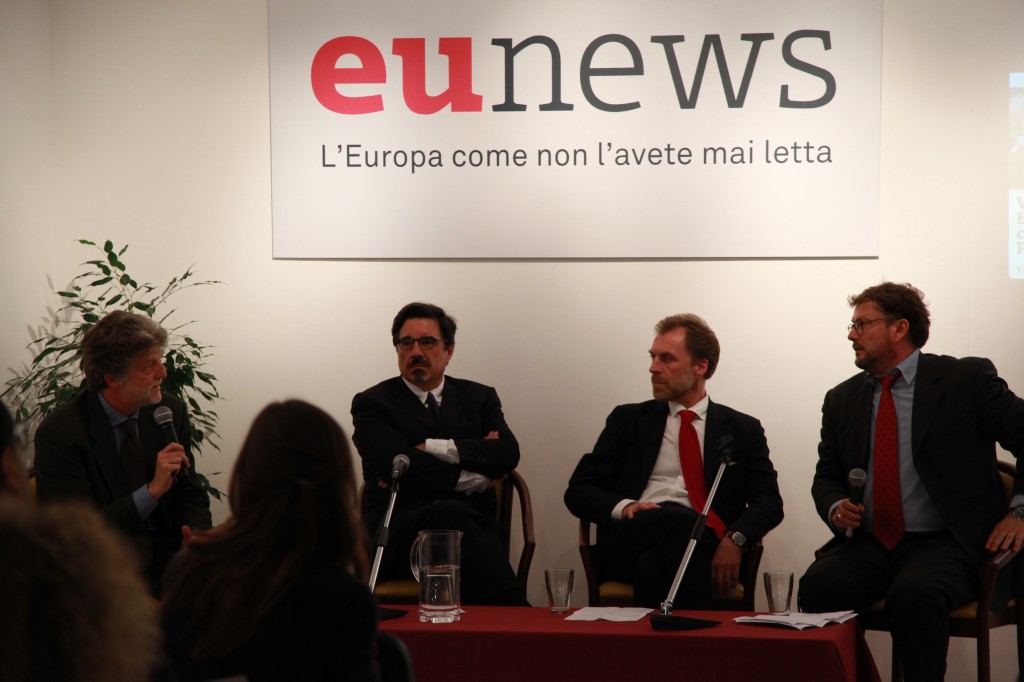If the initiative set up in 2012 found the way to relaunch itself, it is because of the success given by the readers it had in these two years, it is because of the will of informing 70 percent of European citizens saying information about the EU has been unsatisfactory so far. As underlined by Dino Pesole, journalist at Sole 24 ore invited as moderator of the meeting, “during a period in which Europe is too often described with clichés,” we need tools to “re-collocate the debate on the right track of correct and in-depth information.”
This is the challenge for eunews. Without being tempted by easy achievements. For instance, said the Editor-in-Chief, Lorenzo Robustelli, the issue of euroscepticism allow to be more visible on social networks, to be more “mainstream”. Yet, eunews “is not giving up on this.” For sure, “no-Euro” movements will be told in our pages. But the constant run for visibility would be a betrayal of the newspaper’s mission. In a context in which “about 70 percent of national legislation of EU Member States is framed into EU norms,” said Robustelli, “public opinion has the right to be informed about how European institutions work, about their decisions.” That is because “what happens in Brussels,” said Antonio Tajani, European Commission Vice President, “is not something happing out of out national borders, it concerns our daily life.”

Together with Tajani, the event hosted several other EU ‘insiders’. Mariolina Sattanino, RAI journalist, correspondent from Brussels for a long time, who have applauded the “brave choice” by eunews, “because Europe is not a simple topic.” It is in fact easier to talk about ‘trivia facts’ only, talking about “decisions on size and curve degree of bananas.” That is why, according to Sattanino, “initiative dealing with in-depth information about the European Union are crucial. Because Europe is just like modern art,” she added, “at the beginning it is hard to understand it, but then it warms up your heart.”
The Vice President of the Italian Senate, Lidia Lanzillotta, one of the participants to the debate, said that “initiatives such as the one made by eunews make public opinion going beyond provincialism, understanding how the same problems are faced in the other Member States.” The Democratic Party member of parliament, Alessia Rotta, pointed out that euroscepticism is, according to her, caused also be “the flattening of the debate on European issues,” determined by “an evil pact between politics and information” which lately “has flattened the information on politics.” the only way out, according to Rotta, is trying to “tell the European complexity.”
This is what eunews aims at – this is why it has presented some new tools during the meeting in Rome. First, a new weekly magazine, Oneuro, which will be edited by Elido Fazi – partner of the eunews adventure – offering in-depth analysis and stimulating the debate on the international and geopolitical implications of European choices. As Fazi said, it will be “an instrument for strategic thinking about Europe.” This tool will be joined by “The Other Europe” section, which will host on eunews website the most interesting articles on EU issues published on several national and international newspapers.
Last, thanks to the cooperation with Aleteia, eunews will have another new partner: from July 1, the network Eubig will be available: the European Business Italy Group, presented by Giovanni Parapini, owner of Aleteia together with Mauro Lucchetti, as a “club in which member businesses and associations will have the possibility of sharing information, analysis and experiences in order to face their challenges and taking any opportunity Europe can offer.” This is why Parapini called for readers to “follow, correct us and suggest us how we can get better and stronger.”
That is what we are asking our readers, too.



![Palazzo del Mercosur, targa [foto: imagoeconomica]](https://www.eunews.it/wp-content/uploads/2025/04/Imagoeconomica_2336393-scaled-e1743769770968-350x250.jpg)

![La prima Commissione von der Leyen [foto: Wikimedia Commons]](https://www.eunews.it/wp-content/uploads/2025/04/European_Commissioners_2021-350x250.jpeg)





![Palazzo del Mercosur, targa [foto: imagoeconomica]](https://www.eunews.it/wp-content/uploads/2025/04/Imagoeconomica_2336393-scaled-e1743769770968-120x86.jpg)
